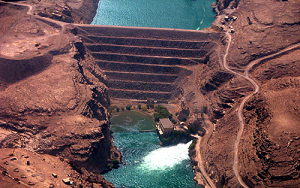Afghanistan Clashes with Iran over Dam Construction
By Sudha Ramachandran
May 2, 2017, the CACI Analyst
Afghanistan’s building of dams on its trans-boundary rivers has drawn the ire of the lower riparian countries. The construction of the Kamal Khan Dam on the Helmand River has caused grave concern in Iran as it could destabilize the situation in its restive Sistan-Baluchistan province. To pressure Kabul to halt construction of the dam, Iran is said to be using Taliban fighters to sabotage projects. Conflicts over water sharing have the potential to turn violent. Iran and Afghanistan need to resolve the issue through talks.

New signs of Chinese military interest in Central Asia
By Stephen Blank
January 16th, 2017, The CACI Analyst
Recent evidence shows a gradual increase in Chinese military activity in Central Asia, particularly with Tajikistan, Afghanistan, and Pakistan, although China has for years denied any military interest in the region. In October, PLA and Tajik forces jointly participated in counterterrorism exercises in Tajikistan near the border with Afghanistan, following earlier activity in 2016. Whereas Tajikistan was then silent, this time it publicized the exercises, which aroused a visible anxiety in the Russian media although the Russian government has hitherto been unwilling to comment on this issue. China’s initiative could imply a major new development in Chinese policy and in Central Asia’s overall security, with lasting implications for the region.
Deeper Afghanistan-India cooperation must not isolate Pakistan
By Sudha Ramachandran
December 15th, 2016, The CACI Analyst
India-Afghanistan relations have warmed considerably in recent months. During Afghan President Ashraf Ghani’s visit to Delhi in mid-September, the two countries deepened their defense and security co-operation and signed an extradition treaty. India also pledged US$ 1 billion towards capacity building in Afghanistan. A few days later, when the Lashkar-e-Taiba, a terrorist group with close links to Pakistan’s Inter-Services Intelligence (ISI), attacked an Indian Army base at Uri in Jammu and Kashmir, Afghanistan came out strongly in support of India. The renewed Delhi-Kabul bonding is likely to have stirred Islamabad’s anxieties. ISI and its terrorist protégés could step up attacks in Afghanistan and India in the coming months.
The phantom menace of ISIS in Northern Afghanistan
By Franz J. Marty
September 8th, 2016, The CACI Analyst
Many accounts allege that the terrorist organization known as the Islamic State in Iraq and Syria (ISIS) has expanded to northern Afghanistan and intends to infiltrate Central Asia from there. Taking a closer look, however, it becomes apparent that virtually all such claims lack a sound foundation and that the remaining, more specific hints like reported sightings of black flags also stand on shaky ground. Consequentially, and contrary to the eastern parts of Afghanistan, there is no compelling evidence of a presence of the self-styled Caliphate in northern Afghanistan and, hence, also no immediate threat to Central Asia.
The death of Mullah Mansour and the future of the Taliban
By John C.K. Daly
June 7th, 2016, The CACI Analyst
On May 21, a U.S. drone attack killed Taliban leader Mullah Akhtar Muhammad Mansour and taxi driver Mohammad Azam near Nushki in Pakistan’s Baluchistan province. Mansour was returning from Taftan, Iran, where he had gone for medical treatment, to his residence near the provincial capital Quetta, a 370-mile journey. Mansour and his driver had completed roughly two-thirds of the nine-hour trip. A Pakistani passport and a Computer National Identity Card (CNIC) identifying Mansur as “Wali Muhammad” were found near the wreckage. Mansour’s death, coming nine months after his contested election as “Amir al-Mu'minin” by the Taliban’s Rahbari Shura, has added additional volatility to Afghanistan’s complex political landscape, effectively sidelining any possibility of renewing peace negotiations with the Afghan government as Mansour’s successor seeks to consolidate his position.







